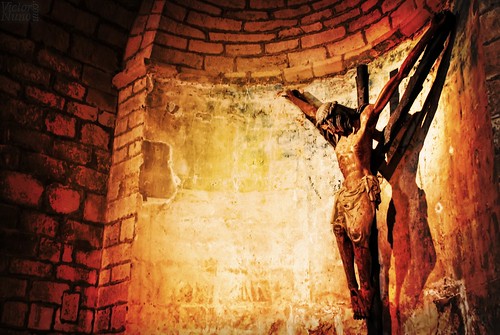We run our website the way we wished the whole internet worked: we provide high quality original content with no ads. We are funded solely by your direct support. Please consider supporting this project.
Does Jesus’ Abandonment on the Cross Destroy the Trinity?
In my previous blog I argued that Jesus’ experience of God-forsakenness on the cross was genuine and that, as a matter of fact, there was a genuine abandonment of Jesus by the Father on the cross. In fact, I am convinced that a good deal of our theology hangs in the balance on our affirming this.
At the same time, this raises some serious questions. Recently, several people have raised criticisms of my view, arguing that it is tantamount to saying that God ceased to exist when Jesus was forsaken. Their criticism might apply to certain theologians who, I agree, go too far in their emphasis on the authenticity of Jesus’ abandonment by the Father. For example, Moltmann sometimes seems to suggest that the Trinity suffered a temporary breakdown on Calvary. In The Crucified God, for example, Moltmann says that Jesus’ abandonment on the cross “divides God from God to the utmost degree of enmity”(152) – a divide that he believes was not reunited until the resurrection.[1] So too, referring to Jesus’ God-forsakenness, Moltman speaks of “a rebellion in God” (227), a “deep division in God himself” (244), a “bifurcation in God” (246), and even an “abyss of godforsakenness, absolute death” and “the non-God” within God (op.cit.).
This sort of extreme language, if taken literally, would seem to suggest that God temporarily ceased to exist. If God’s eternal essence is the perfect love of the Father, Son and Holy Spirit, as I believe, then any suggestion that this perfect love was severed, even for a moment, would, by definition, entail that God ceased to exist. Such a conclusion is, to my way of thinking, a logical impossibility. In fact, a close reading of Moltmann leads me to conclude that he would probably agree with this conclusion – his rhetorical flourishes notwithstanding.[2]
I don’t believe we need to deny the genuineness of the abandonment of Jesus on the cross to avoid this impossible conclusion, however. If we simply remember that this separation of the Father and Son was entered into by all three divine Person’s out of love for human kind and for one another, then, as paradoxical as it may sound, the anguished separation of the Father and the Son on the cross can be seen as the quintessential expression of the loving unity of the Father and the Son. Indeed, the unsurpassable cost of this divine separation expresses the unsurpassable perfection of the love of this divine union.
A couple of dear friends of mine — Tom Belt and Dwayne Polk — are presently arguing that my current position is at odds with the position I articulated in Trinity and Process. While I have no problem acknowledging when my views have changed over the years, it seems to me that on this particular topic, my view is the same as what I espoused in this work.[3] To cite the passage that Tom quoted against me, I argue that, “The metaphysical necessity of God’s self-relationality means…that it is not possible to conceive of the death of the Son as anything other than an expression of the intense love of God’s inner life” (Trinity and Process, 381, n.64). I believed then as I believe now, that it is precisely because the Son was, out of love, willing to go to the furthest extreme that was metaphysically possible– viz. to the point of becoming our sin (2 Cor.5:21) and becoming our God-forsaken curse (Gal. 3:13) — that the cross is the quintessential expression of the love that God eternally is. It is this logic of the cross, I believe, that led John to define God as “love” (1 Jn. 4:8) while defining the love that God is by pointing us to the cross (I Jn. 3:16) reveals the unsurpassable love that defines God throughout eternity.
Perhaps the best way of thinking about this is to distinguish between the love and unity that the three divine persons experience, on the one hand, and the love and unity that defines God’s eternal essence, on the other. We could say that on the cross, the former was momentarily sacrificed as an expression of the latter. That is, the three divine Person’s sacrificed their previously uninterrupted experience of perfect love and union in order to express the perfect love and union that defines them as God.
We might, for illustrative purposes, think of this along the following lines. Imagine a perfectly loving husband and wife who had a rebellious son whose own foolishness had gotten him kidnapped by a band of demented criminals who planned on slowly torturing him to death. Suppose that this couple hit upon an ingeniously sophisticated plan to outwit the kidnappers and rescue their son that required them to offer the wife in exchange for the son and to then rescue her, though, for whatever reason, the wife’s rescue would only be possible several days later. And suppose that this plan also required the wife to take a pill that induced selective amnesia, causing her to forget why she was being delivered over to the kidnappers as well as to forget the plan to rescue her in several days. (It’s beside the point of this analogy to wonder how a pill could do this or how any of this might take place).
Once the plan was enacted, the wife would experience the unimaginable emotional pain of feeling abandoned by her beloved husband to demented kidnappers, and, from her perspective, for no reason whatsoever. So too, she would experience the nightmarish pain inflicted on her by these evil people as they slowly tortured her to death. And, having forgotten the rescue plan, she would suffer this in an utterly hopeless fashion. And the husband, for his part, would suffer the equally nightmarish pain of knowing his wife was suffering emotionally as she believed she was betrayed, as well as the pain of knowing his wife was suffering physically at the hand of her evil tormentors.
In this imaginary scenario, it’s evident that the husband and wife experienced the very real pain of having their loving relationship interrupted. Yet, the fact that they were willing to experience this terrible temporary separation didn’t break their perfect love: it rather expressed it. For this temporary separation was entered into only because of the profound love these two had for one another and for their son.
This, I submit, is something like what happened within the Godhead when Jesus was forsaken on the cross. The Father, Son and Spirit experienced a very real separation when Jesus was delivered over to wicked humans and fallen powers to suffer the death-consequences of the sin of the world. And it is for this reason that I contend that, as paradoxical as it sounds, the very real abandonment of Jesus on the cross, culminating in his despairing cry on the cross, expresses rather than negates the loving unity of God.
I thus am in full agreement with Moltmann when he proclaims that the abandonment of Jesus on the cross was absolutely real and that a great deal of our theology hangs on affirming this reality. I am also in full agreement with his repeated emphasis that the revelation of God on the cross revolutionizes our concept of God. As he demonstrates in The Crucified God, it blows apart the classical philosophical conception of God as altogether immutable, impassible, pure actuality, atemporal, etc. But I do not believe we need to suppose that there was a break in the God-defining love of the three divine Persons to affirm this.
[1] Moltmann, The Crucified God: The Cross as the Criterion and Criticism of Christian Theology (Minneapolis: Fortress, 1993). At the same time, Moltmann is prone toward rhetorical flourishes that make his views sound more extreme than they actually are. As I’ll argue in a moment, Moltmann elsewhere makes statements which, if worked through consistently, would render his theology of Jesus’ godforsakenness logically coherent.
[2] For example, Moltmann at one point says that, while the abandonment of Jesus constitutes a real separation of the Father and Son, it also “expresses a deep conformity between the will of the Father and the will of the Son in the event of the cross” (ibid., 243). So too, while “the Father and the Son are most deeply separated in forsakenness” on the cross, they are “at the same time…inwardly one in their surrender”(ibid., 244). Hence, Moltmann contends that, while there’s a contradiction in God on the cross, there is “at the same time a unity in God, in so far as God was at one with God and corresponded to himself” (ibid., 244). Though he himself doesn’t reconcile these statements with his other more extreme statements about the “deepest enmity between God and God,” he could easily have done so along the lines that I shall now propose.
[3] G. Boyd, Trinity and Process: A Critical Evaluation and Reconstruction of Hartshorne’s Di-Polar Theism Towards a Trinitarian Metaphysics (New York: Lang, 1992). I should here acknowledge that Dwayne and Tom also argue that my view entails a kenotic Christology, which they deem to be unorthodox, and that it entails tri-theism, which we all agree is unorthodox. I can’t here enter into the labyrinth of issues surrounding these allegations, except to say: a) I acknowledge that I, along with many other evangelicals, embrace a kenotic Christology, though I don’t believe it is at all unorthodox; and b) I think the reasoning that leads my two friends to the conclusion that I’m a tri-theist is seriously muddled.
Víctor Nuño via Compfight
Category: Essays
Tags: Abandonment, An Open Orthodoxy, Cruciform Theology, Dwayne Polk, Essay, Father, God is Love, Godhead, Jesus, Tom Belt, Trinity, Trinity and Process
Topics: Atonement and The Cross, Theological Method, Trinity
Related Reading

Did Jesus Believe in Satan?
Jesus’ teaching, his exorcisms, his healings and other miracles, as well as his work on the cross, all remain somewhat incoherent and unrelated to one another until we interpret them as acts of war. As in apocalyptic thought of the time of Jesus, the assumption that undergirds Jesus’ entire ministry is that Satan has illegitimately…

Penal Substitution View of Atonement: Did God the Father Just Need to Vent?
In this video blog, Greg outlines the penal substitution view of atonement which says that the Father poured out his wrath on Jesus instead of us so that we could be forgiven. This view is very common and you might even be nodding your head in agreement with that description. However, this view creates some…

Podcast: Do We Apply a Cruciform Lens to the Writings of Paul Even Though He Writes After Christ?
Greg talks about Paul and Peter and the slow acclimation of Christ’s message in the early church. http://traffic.libsyn.com/askgregboyd/Episode_0413.mp3

Cross Centered Q&A
For those within driving distance of Saint Paul, MN, we invite you to join us for a free event. Greg will be discussing his new book Crucifixion of the Warrior God with Bruxy Cavey (Pastor of The Meeting House in Toronto) and Dennis Edwards (Pastor of Sanctuary Covenant Church in Minneapolis). Don’t miss this opportunity to hear Greg…

What We Long For
Augustine once prayed, “You have made us for yourself, and our hearts are restless till they find their rest in you.” We all have an unquenchable yearning in our hearts, a yearning for nothing less than to share in God’s own eternally full life. This is why our deepest desires cannot be permanently satisfied by…

